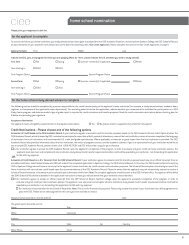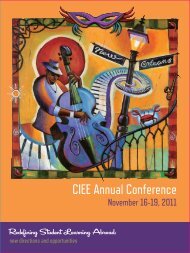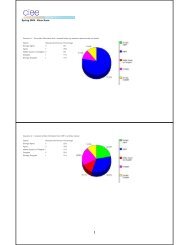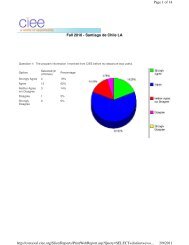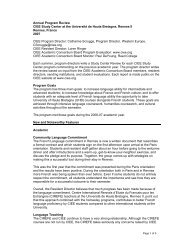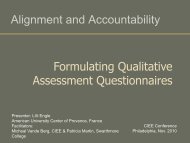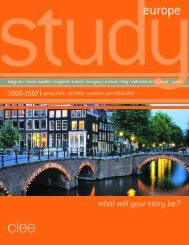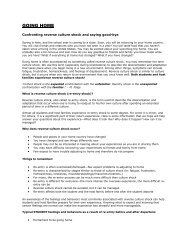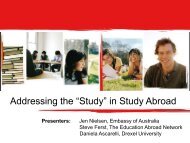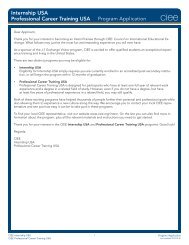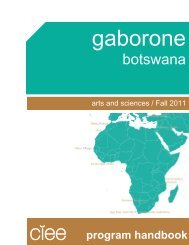Resident Director Report - Council on International Educational ...
Resident Director Report - Council on International Educational ...
Resident Director Report - Council on International Educational ...
You also want an ePaper? Increase the reach of your titles
YUMPU automatically turns print PDFs into web optimized ePapers that Google loves.
Annual Study Center Review<br />
CIEE Study Center at the University of Jordan, Amman<br />
Language and Culture Program<br />
2010<br />
CIEE Program <str<strong>on</strong>g>Director</str<strong>on</strong>g>: Adam Rubin, Program <str<strong>on</strong>g>Director</str<strong>on</strong>g>, Africa, Middle East, & Northern,<br />
Central, and Eastern Europe<br />
CIEE <str<strong>on</strong>g>Resident</str<strong>on</strong>g> <str<strong>on</strong>g>Director</str<strong>on</strong>g>: Allis<strong>on</strong> Hodgkins<br />
CIEE Academic C<strong>on</strong>sortium Board Program Evaluati<strong>on</strong>: www.ciee.org<br />
CIEE Academic C<strong>on</strong>sortium Board M<strong>on</strong>itor: Kathleen Sideli, Indiana University<br />
Each summer, program directors write a Study Center Review for each CIEE Study Center<br />
program commenting <strong>on</strong> the previous academic year. The program director writes the review<br />
based <strong>on</strong> input from the CIEE Academic C<strong>on</strong>sortium Board members, resident directors,<br />
sending instituti<strong>on</strong>s, and student evaluati<strong>on</strong>s. Each report is made public <strong>on</strong> the CIEE website at<br />
www.ciee.org.<br />
Program Goals<br />
The CIEE Language and Culture program provides a rigorous and challenging academic<br />
program, combined with in-country cultural experiences and intensive Arabic language study.<br />
Students gain a greater understanding of the Middle East, with specific emphasis <strong>on</strong> the<br />
Jordanian perspective and experience.<br />
Based <strong>on</strong> feedback from the CIEE students and resident staff, the program goals were<br />
successfully met during the 2009-10 academic year.<br />
The Language and Culture program had a very successful year in 2009-10. Students rated the<br />
Arabic language instructi<strong>on</strong>, CIEE resident staff, cultural activities and field trips, and housing<br />
very favorably. Despite the rapid growth of the program, CIEE has added staff and language<br />
instructors in order to provide the students with small, interactive language classes and superior<br />
support.<br />
New and Noteworthy<br />
The CIEE Language and Culture (Amman LC) program is designed to provide students with<br />
intensive Arabic language training, interesting area studies courses focused <strong>on</strong> Middle Eastern<br />
politics, religi<strong>on</strong>, literature, and history, and a co-curricular program that gives students a<br />
firsthand look into Jordanian society and culture. The program is able to support a wide range of<br />
Arabic language backgrounds and various academic interests.<br />
The program grew c<strong>on</strong>siderably in 2009-10. In order to maintain overall program quality and add<br />
additi<strong>on</strong>al program features, CIEE added new resident staff and language instructors and<br />
expanded the size of its study center facilities this year. Feedback from fall 2009 and spring<br />
2010 indicates that students found the overall program challenging and rewarding <strong>on</strong> many<br />
levels, and most participants said that they would recommend the program to future students.<br />
Page 1 of 10
Academic<br />
Arabic Language<br />
The Amman LC program is designed to accommodate students with a wide range of Arabic<br />
language backgrounds. Each semester, the program includes students with no prior language<br />
background as well as those who have studied Arabic for 1-2 years. Although the program does<br />
not have a formal CIEE Community Language Commitment policy in effect, staff encourage<br />
students to use Arabic as much as possible throughout the semester. Highly motivated students<br />
(of all levels) have the opportunity to use Arabic everyday in CIEE classes, language club<br />
activities, and interacti<strong>on</strong>s with CIEE language peer tutors, CIEE student assistants, University<br />
of Jordan students, and CIEE homestay families. CIEE Amman staff are c<strong>on</strong>sidering new<br />
strategies for motivating the Amman LC program participants to use Arabic more and will try to<br />
institute a Community Language Commitment more successfully in 2010-11. Given the various<br />
level of student motivati<strong>on</strong>s for learning and using Arabic <strong>on</strong> this program, however, the staff<br />
understand that it may be difficult to get all of the students to support a language commitment<br />
next year.<br />
The fall 2009 and spring 2010 students rated the CIEE Arabic language courses very favorably.<br />
There was a noticeable improvement in student satisfacti<strong>on</strong> and language outcomes this year.<br />
Some students found the language comp<strong>on</strong>ent of the program too intensive, but most indicated<br />
that the CIEE language curriculum helped them to make significant gains this year.<br />
Language Training and Materials for CIEE Arabic Language Courses<br />
CIEE Amman has a full-time <str<strong>on</strong>g>Director</str<strong>on</strong>g> of Arabic Language. He has worked closely with the<br />
<str<strong>on</strong>g>Resident</str<strong>on</strong>g> <str<strong>on</strong>g>Director</str<strong>on</strong>g> and CIEE veteran language instructors over the past several years to develop<br />
a CIEE language curriculum that meets the needs of American students from a diverse range of<br />
language backgrounds and motivati<strong>on</strong>s. Overall, student feedback from both the Amman AL<br />
and Amman LC students in 2009-10 indicates that the CIEE Arabic language curriculum is<br />
highly effective in helping motivated students to make significant progress each semester. The<br />
<str<strong>on</strong>g>Director</str<strong>on</strong>g> of Arabic Language meets regularly with the language instructors to discuss the<br />
curriculum and specific course issues. These meetings also provide a good level of peer-to-peer<br />
training am<strong>on</strong>gst the instructors and allow for the sharing of ideas and resources.<br />
CIEE c<strong>on</strong>tinues to re-evaluate and make adjustments to its overall language curriculum in<br />
Jordan. This year, over 200 pages of new, local source material was incorporated into the<br />
Amman AL program. One of the senior instructors used his experience with the Ministry of<br />
Educati<strong>on</strong> to help develop exams and setting evaluati<strong>on</strong> standards for the Amman AL program<br />
in 2009-10.<br />
The CIEE Amman <str<strong>on</strong>g>Resident</str<strong>on</strong>g> <str<strong>on</strong>g>Director</str<strong>on</strong>g> and <str<strong>on</strong>g>Director</str<strong>on</strong>g> of Arabic Language teamed with the CIEE<br />
Program <str<strong>on</strong>g>Director</str<strong>on</strong>g> and colleagues from other organizati<strong>on</strong>s and instituti<strong>on</strong>s to coordinate and<br />
deliver a special workshop at the CIEE Annual C<strong>on</strong>ference in Istanbul, Turkey entitled “Arabic<br />
101: Challenges and Opportunities with Arabic Instructi<strong>on</strong> for Americans Studying in the Arab<br />
World.” This workshop explored challenges with language curriculum development, the impact<br />
of regi<strong>on</strong>al Arabic dialects <strong>on</strong> language instructi<strong>on</strong>, debates around the use of local source<br />
materials in language courses, and the increasing demand <strong>on</strong> study abroad programs to provide<br />
programs that meet a diverse group of Arabic language levels.<br />
CIEE Amman uses a pre- and post-test to m<strong>on</strong>itor and evaluate student progress throughout<br />
the semester. Results from 2009-10 indicate that, <strong>on</strong> average, students <strong>on</strong> the CIEE Amman<br />
programs are improving 1.5-2.0 levels (CIEE curriculum) each semester. This equates to an<br />
Page 2 of 10
average gain of approximately 24 points from the pre-test to the post-test. Test results have<br />
indicated that CIEE language instructi<strong>on</strong> has c<strong>on</strong>sistency and c<strong>on</strong>tinuity. In other words, the<br />
average improvements within each level are c<strong>on</strong>sistent, and there is a clear pattern of progress<br />
from level to level within each CIEE Amman program. Further, the CIEE Amman <strong>on</strong>-site test has<br />
proven to be a good measure of student achievement, as the difference between test rank and<br />
class rank (overall class outcomes) is minimal across all levels. CIEE analysis of the Amman<br />
language curriculum has also shown that the output is more c<strong>on</strong>sistent than the input. Despite<br />
the fact that students <strong>on</strong> both the CIEE Amman AL and LC programs come from a variety of<br />
U.S. instituti<strong>on</strong>s, the <strong>on</strong>-site placement test helps place them into appropriate CIEE language<br />
levels, thereby maximizing the potential for significant improvement and c<strong>on</strong>sistently high<br />
results.<br />
Please see the “Future Directi<strong>on</strong>s” secti<strong>on</strong> at the end of this report for additi<strong>on</strong>al informati<strong>on</strong><br />
about the ACTFL/OPI language training and certificati<strong>on</strong> workshop organized by CIEE for its<br />
Amman language instructors in late spring 2010.<br />
Subject Area Courses<br />
All of the CIEE Amman Language and Culture program courses are for CIEE students <strong>on</strong>ly.<br />
However, courses are taught in regular academic buildings <strong>on</strong> the University of Jordan campus,<br />
thereby allowing students to interact with University of Jordan students between classes. In<br />
previous years, CIEE used the University of Jordan Language Center for its courses. However,<br />
as local students are not allowed to enter the Language Center, CIEE decided to switch its<br />
courses to other facilities at the University of Jordan in order to facilitate better cultural and<br />
academic immersi<strong>on</strong>. Although there were some occasi<strong>on</strong>al problems with course scheduling<br />
and classroom availability, feedback from 2009-10 indicates that both CIEE staff and students<br />
appreciated this important change. Students in fall 2009 and spring 2010 were generally<br />
satisfied with the overall CIEE language and area studies courses.<br />
CIEE Courses<br />
All students <strong>on</strong> the Amman LC program are required to take Modern Standard Arabic, Colloquial<br />
Jordanian Arabic, and two area studies courses. As previously menti<strong>on</strong>ed, most students in fall<br />
2009 and spring 2010 were extremely satisfied with the CIEE Modern Standard Arabic (MSA)<br />
and Colloquial Jordanian Arabic courses. The CIEE <str<strong>on</strong>g>Director</str<strong>on</strong>g> of Arabic Language and the<br />
language instructors have revised various MSA levels in order to use a combinati<strong>on</strong> of the<br />
popular U.S. al-Kitaab language series as well as locally developed language materials.<br />
Although some students would clearly prefer a completely al-Kitaab based curriculum, the<br />
overall outcomes this year indicate that the CIEE curriculum is working very well and provides<br />
students with a highly effective language program.<br />
In 2009-10, CIEE introduced a new Media Arabic course for students who placed into Advanced<br />
I or Advanced II <strong>on</strong> the CIEE language placement test. This new course was very well received<br />
by the students, as it allowed them to take an additi<strong>on</strong>al advanced Arabic course in lieu of <strong>on</strong>e<br />
area studies course. In additi<strong>on</strong> to this new course, several new professors were added to the<br />
CIEE faculty this year. Several of these professors were rated very positively by CIEE students,<br />
and their new courses helped take the pressure off of a few CIEE courses that had become<br />
somewhat large in 2008-09. As in previous years, CIEE students were particularly satisfied with<br />
the courses focusing <strong>on</strong> Middle East politics and internati<strong>on</strong>al relati<strong>on</strong>s. Here is a complete list<br />
of the courses offered by CIEE in 2009-10:<br />
Page 3 of 10
Arabic Language<br />
Beginning Arabic I<br />
Beginning Arabic II<br />
Intermediate Arabic I<br />
Intermediate Arabic II<br />
Advanced Arabic I<br />
Advanced Arabic II<br />
Beginning Colloquial Jordanian Arabic I<br />
Beginning Colloquial Jordanian Arabic II<br />
Intermediate Colloquial Jordanian Arabic I<br />
Intermediate Colloquial Jordanian Arabic II<br />
Advanced Colloquial Jordanian Arabic I<br />
Advanced Colloquial Jordanian Arabic II<br />
Advanced Topics in Modern Standard Arabic<br />
Media Arabic<br />
Area Studies<br />
Archaeological Survey of Jordan and Palestine<br />
Ec<strong>on</strong>omic Transformati<strong>on</strong>s in the Middle East<br />
Envir<strong>on</strong>ment and the Politics of Water<br />
America and the Arabs<br />
C<strong>on</strong>temporary Thought in the Islamic World<br />
Internati<strong>on</strong>al Relati<strong>on</strong>s and Diplomacy in the Middle East<br />
Jordan and the Arab-Israeli C<strong>on</strong>flict<br />
C<strong>on</strong>temporary Arab Women Writers<br />
Structure of Arab Societies<br />
C<strong>on</strong>flicts in the Middle East<br />
CIEE Internship (must be pre-approved prior to the start of each semester)<br />
Student feedback <strong>on</strong> the area studies courses improved somewhat in 2009-10. Many students<br />
commented <strong>on</strong> the fact that the local professors present very different and unique perspectives<br />
<strong>on</strong> Middle Eastern politics and internati<strong>on</strong>al relati<strong>on</strong>s. For most of these students, it was<br />
extremely interesting to hear opini<strong>on</strong>s that differed significantly from the opini<strong>on</strong>s expressed in<br />
the U.S. media, while others found it very difficult at times to hear perspectives that challenged<br />
their understanding of sensitive political, historical, and cultural issues.<br />
Out of Classroom Activities<br />
CIEE language classes often include out-of-classroom activities designed to give students<br />
practical applicati<strong>on</strong> of the c<strong>on</strong>cepts covered in the classrooms. These activities included visits<br />
to the local zoo, markets, and walking tours <strong>on</strong> the University of Jordan campus.<br />
Students <strong>on</strong> this program have the opti<strong>on</strong> of meeting with a CIEE language peer tutor for<br />
additi<strong>on</strong>al language support and cultural immersi<strong>on</strong>. In additi<strong>on</strong> to language exchange<br />
opportunities with their peer tutors, CIEE students also interact <strong>on</strong> a regular basis with the CIEE<br />
Amman student interns, local University of Jordan students who work part-time in the CIEE<br />
Study Center. Feedback from the fall 2009 and spring 2010 students indicates that the peer<br />
language tutor system was moderately successful this year. For some students, the system<br />
worked well and allowed for the CIEE student and peer tutor to meet <strong>on</strong> a regular basis for<br />
informal language exchange. For others, however, there was not a good “fit” between the CIEE<br />
Page 4 of 10
student and language peer, leading to less frequent meetings and less rewarding outcomes.<br />
CIEE staff will examine ways to make the language peer tutor system more effective in 2010-11.<br />
The “Envir<strong>on</strong>ment and the Politics of Water” course included a full day trip to various key water<br />
sites in Jordan, including the King Talal Dam, and the Jordan Valley Water Treatment Facility.<br />
Students appreciated the opportunity to see Jordan’s water resources and challenges firsthand<br />
with a local expert. However, some students found the course to be too technical and focused<br />
more <strong>on</strong> water resource management than the politics of water management in the regi<strong>on</strong>.<br />
Experiential educati<strong>on</strong> is a somewhat new c<strong>on</strong>cept to many professors and language instructors<br />
in Jordan. However, CIEE staff plan to meet with the faculty in summer 2010 to discuss ways<br />
that more out-of-classroom activities can be included in courses in 2010-11. Please see<br />
additi<strong>on</strong>al informati<strong>on</strong> below <strong>on</strong> the language club activities, peer language tutors, and other<br />
out-of-classroom language learning opportunities included in the Amman LC program.<br />
N<strong>on</strong>-Academic<br />
CIEE Orientati<strong>on</strong><br />
The Amman LC orientati<strong>on</strong> is designed to introduce students to a range of important cultural,<br />
academic, and logistical issues. CIEE resident staff and student assistants lead sessi<strong>on</strong>s <strong>on</strong><br />
health, safety, and security issues, the academic program, student housing and homestays,<br />
local logistics, and important cultural c<strong>on</strong>siderati<strong>on</strong>s. The fall 2009 and spring 2010 orientati<strong>on</strong>s<br />
also included local and regi<strong>on</strong>al field trips to help students get a better understanding of Jordan<br />
and the city of Amman. All students take the CIEE language placement exam and then begin<br />
Colloquial Jordanian Arabic during the orientati<strong>on</strong> period.<br />
Overall, most students rated the orientati<strong>on</strong> positively this year and indicated that the<br />
informati<strong>on</strong> presented was well-organized and interesting. Some students said that the<br />
orientati<strong>on</strong> focused too much <strong>on</strong> cultural c<strong>on</strong>siderati<strong>on</strong>s and security. However, given the<br />
locati<strong>on</strong> of the program and reality of tensi<strong>on</strong>s in the Middle East, this is an area that CIEE will<br />
c<strong>on</strong>tinue to emphasize both during the orientati<strong>on</strong> and throughout each semester. Fortunately,<br />
most students this year understood that these issues were crucial to their ability to have a safe<br />
and rewarding experience in Jordan and followed CIEE advice carefully throughout the durati<strong>on</strong><br />
of the program.<br />
As the Amman LC program has increased in size, CIEE staff have adjusted the orientati<strong>on</strong> to<br />
make it more interactive and appropriate for the large student group. Additi<strong>on</strong>al changes will be<br />
made in 2010-11 in order to include smaller group orientati<strong>on</strong> activities.<br />
Cultural Activities/Field Trips<br />
The CIEE program includes a series of <strong>on</strong>-going language and cultural activities as well as local<br />
excursi<strong>on</strong>s and overnight field trips each semester. Students rated these comp<strong>on</strong>ents of the<br />
program very positively and were extremely satisfied with the fall 2009 and spring 2010 cultural<br />
activities and field trips. CIEE has made some of the overnight field trips opti<strong>on</strong>al in order to give<br />
students more flexibility and help ensure that students are not forced to participate in trips that<br />
do not interest them. Overall, the students in fall 2009 and spring 2010 were most satisfied with<br />
the field trips that focused <strong>on</strong> eco-tourism and Biblical Jordan.<br />
Day or Evening Activities<br />
Here is a brief descripti<strong>on</strong> of the excursi<strong>on</strong>s offered to CIEE Amman LC students in fall 2009<br />
and spring 2010:<br />
Page 5 of 10
Biblical Jordan: This day trip explores Jordan’s biblical sites, as well as examples from<br />
Jordan’s Byzantine period. Highlights include the Baptismal site <strong>on</strong> the Jordan River; designated<br />
by Pope John Paul II as the site of Jesus’ baptism, Mt. Nebo, site of Moses final look into the<br />
Holy Land, St George’s Church in Madaba; “Church of the Map,” and a short hike up Herod’s<br />
summer palace of M’kawir, site of the beheading of John the Baptist. Students eat lunch at<br />
Madaba at Haret’ Judna, a local restaurant in a renovated, historic villa.<br />
Eastern Desert Tour: This tour explores Jordan’s harder to reach Eastern Desert and its prime<br />
examples of Omayyad era art and architecture. The trip includes the castles (actually caravan<br />
stops and hunting lodges) of Hallabat, Azraq, Khrammeh and the UNESCO protected Amra and<br />
its impressive frescoes. This trip also includes a visit to the Azraq wetlands (which are actually<br />
quite dry now) and the Royal Society for the Protecti<strong>on</strong> of Nature reserve. This day trip helps<br />
students to understand the water crisis facing Jordan today.<br />
Wadi Mukhaires: This full-day hike requires a minimum physical effort, but CIEE provides<br />
students with knee pads and helmets just in case. The hike includes a l<strong>on</strong>g walk to a big<br />
waterfall, lunch at the birth of the wadi (valley, riverbed), and the chance to see a beautiful<br />
green cave.<br />
Students who are religiously observant and interested in history found the Biblical Jordan field<br />
trip to be extremely rewarding, while those more interested in nature and eco-tourism<br />
appreciated the opportunity to explore Jordan’s natural resources and get some fresh air.<br />
Clubs and Other Cultural Activities<br />
Each semester, CIEE student interns coordinate various “culture clubs” to provide students with<br />
the opportunity to learn about traditi<strong>on</strong>al crafts such as embroidery and henna painting,<br />
Jordanian cuisine, and traditi<strong>on</strong>al dance. CIEE interns also coordinate a “c<strong>on</strong>versati<strong>on</strong> club” that<br />
allows students to discuss topics such as traditi<strong>on</strong>al marriage, Islam, and stereotypes in English<br />
with local students. These clubs were very well attended during the 2009-10 academic year.<br />
The “calligraphy club” was popular at first, but participati<strong>on</strong> dwindled to a small number of<br />
dedicated students who eventually learned to produce small works of art with Arabic script. This<br />
club was led by <strong>on</strong>e of the CIEE language instructors. Finally, the CIEE <str<strong>on</strong>g>Director</str<strong>on</strong>g> of Arabic<br />
Language offered a “Ten Forms Club,” an interactive, n<strong>on</strong>-credit club that focused <strong>on</strong> mastering<br />
the Arabic verb system. This club was well attended and received very positive feedback from<br />
the advanced language students this year.<br />
Overnight Fieldtrips<br />
The fall 2009 and spring 2010 students had very positive things to say about the two overnight<br />
field trips offered each semester. For many, these trips to Petra and Wadi Rum were major<br />
program highlights. Students relished the opportunity to walk in the footsteps of Lawrence of<br />
Arabia in Wadi Rum and experience the w<strong>on</strong>ders of the ancient city of Petra. Students in 2009-<br />
10 commented that the field trips were organized very well, allowed ample time for explorati<strong>on</strong>,<br />
and provided good, knowledgeable guides. Some students were frustrated by the large size of<br />
the groups this year. CIEE staff will c<strong>on</strong>sider ways to offer these popular trips multiple times<br />
each semester in order to make the student groups smaller. However, rising costs for tours to<br />
these famous sites make it difficult for CIEE to do so.<br />
Petra Field Trip<br />
CIEE students and staff tour the unique castle ruins at Shobak and then have an evening<br />
cooking less<strong>on</strong> at the “Petra Kitchen.” In the evening, students have free time to explore Wadi<br />
Page 6 of 10
Musa. Early the next morning, the group enters Petra and tours the famous Siq and Treasury<br />
before the large crowds arrive from Amman. Students then have additi<strong>on</strong>al time to explore the<br />
rest of Petra’s w<strong>on</strong>ders.<br />
Wadi Rum Trip<br />
Highlights of this popular CIEE overnight field trip include a 4X4 tour through the desert, sand<br />
dune hiking, and an overnight at the famous “Captain’s Camp” in Bedouin tents. This year, the<br />
excursi<strong>on</strong> also included a camel trek through the desert. This field trip allows students to see the<br />
beautiful night sky and some of the most spectacular desert scenery in the world.<br />
Housing<br />
The CIEE Amman LC program offers two different housing opti<strong>on</strong>s: CIEE-managed student<br />
apartments and CIEE homestays with local Jordanian families. Overall, fall 2009 and spring<br />
2010 students were very satisfied with the program housing. Here is a breakdown of student<br />
housing choices in 2009-10:<br />
Fall 2009: Homestays: 71%<br />
Apartments: 29%<br />
Spring 2010: Homestays: 66%<br />
Apartments: 34%<br />
These breakdowns were c<strong>on</strong>sistent with student choices over the past few years, as more<br />
students c<strong>on</strong>tinue to choose homestays for the linguistic and cultural immersi<strong>on</strong>s that they can<br />
provide. Most of the homestays worked out very well this year, although there were a few minor<br />
and typical issues involving communicati<strong>on</strong> challenges between students and their hosts. Some<br />
students were surprised to learn that their homestay families were Christian and not Muslim.<br />
CIEE recruits a variety of local families in order to help provide suitable families for the diverse<br />
group of CIEE students. Students in the CIEE apartments were generally satisfied with the<br />
quality of the apartments, although some students expressed c<strong>on</strong>cerns about the quality of<br />
some of the furnishings and kitchen equipment in specific apartments. CIEE staff feedback<br />
indicates that there were some major challenges with the behavior of some CIEE students in<br />
apartments this year. Although the apartments do offer students more overall flexibility than<br />
homestays, there are cultural rules and expectati<strong>on</strong>s that CIEE students must follow in the<br />
apartments. Some landlords had problems with CIEE students who did not follow policies<br />
regarding overnight guests, alcohol c<strong>on</strong>sumpti<strong>on</strong>, and noise. CIEE staff will reinforce these<br />
policies more strictly in 2010-11. CIEE also hopes to recruit some local program alumni to live in<br />
some of the apartments and help m<strong>on</strong>itor student housing more carefully in future semesters.<br />
Community Engagement and Integrati<strong>on</strong><br />
Community engagement is an important comp<strong>on</strong>ent of the CIEE program. Students may choose<br />
between not-for-credit volunteer projects and a for-credit CIEE Internship. The internship<br />
requires a proposal and pre-approval from CIEE and the student’s home instituti<strong>on</strong> prior to the<br />
start of the semester. Students who participated in CIEE internships this year were quite<br />
satisfied with their experiences, and several noted that these projects were <strong>on</strong>e of the highlights<br />
of their overall time in Jordan.<br />
For-Credit Internship and Community Service Opti<strong>on</strong>s<br />
Here is a brief overview of the CIEE Internship sites in fall 2009 and spring 2010:<br />
Page 7 of 10
Fall 2009 / Spring 2010<br />
<br />
<br />
<br />
<br />
<br />
<br />
<br />
<br />
<br />
<br />
<br />
<br />
<br />
People in Need: Czech NGO focusing <strong>on</strong> refugees in Jordan from Iraq<br />
SUNY Buffalo Legislative Strengthening Project: Research and advocacy to teach<br />
the Jordanian parliament and civil society about effective legislati<strong>on</strong><br />
Jordan Nati<strong>on</strong>al Committee for Women: Research and advocacy <strong>on</strong> women’s rights in<br />
Jordan<br />
Nati<strong>on</strong>al Democratic Institute: American government-affiliated n<strong>on</strong>-profit organizati<strong>on</strong><br />
focused <strong>on</strong> democratic institutes in Jordan and Iraq<br />
King Hussein Cancer Center: Public hospital and research center<br />
Jordan Envir<strong>on</strong>ment Society: Envir<strong>on</strong>mental advocacy and c<strong>on</strong>servati<strong>on</strong><br />
Young Entrepreneurs Society: Organizati<strong>on</strong> that promotes a better business climate<br />
for young business people and future business owners<br />
Internati<strong>on</strong>al Soluti<strong>on</strong>s Group: American development company focused <strong>on</strong><br />
infrastructure development<br />
Royal Society for the C<strong>on</strong>servati<strong>on</strong> of Nature: Organizati<strong>on</strong> built under royal<br />
patr<strong>on</strong>age. It maintains Jordanian parks and nature reserves and advocates for their<br />
protecti<strong>on</strong> and expansi<strong>on</strong><br />
Engic<strong>on</strong>: Jordanian development organizati<strong>on</strong> focused <strong>on</strong> local tenders and bids for<br />
internati<strong>on</strong>al development grants.<br />
Oxford Business Group: UK based NGO focused <strong>on</strong> annual ec<strong>on</strong>omic reports<br />
PBYRC: Princess Basma Youth Resource Center<br />
RHSC: Jordanian research organizati<strong>on</strong> focused <strong>on</strong> regi<strong>on</strong>al human security<br />
Not-for-Credit Community Service/Volunteer<br />
Approximately fifty CIEE students participated in this year’s “Abraham’s Path Initiative” day trip<br />
and volunteer activity. Based <strong>on</strong> the accepted path of Abraham, a patriarch comm<strong>on</strong> to<br />
Judaism, Christianity, and Islam, the initiative traces his journey from near Antioch in modern<br />
day southern turkey to historic Palestine. Students assisted with a highway trash collecti<strong>on</strong><br />
project, painted several classrooms at a local high school and ate lunch with local villagers. This<br />
was a very successful event and will be repeated in future semesters.<br />
CIEE also organized four student and staff teams for the annual Dead-to-Red relay marath<strong>on</strong> in<br />
spring 2010. The 242-kilometer race begins <strong>on</strong> the shore of the Dead Sea and ends at the Red<br />
Sea port of Aqaba. CIEE helped sp<strong>on</strong>sor the event, and all involved said it was a rewarding and<br />
fun activity.<br />
Challenges<br />
Academic<br />
Overall, most of the students were very satisfied with the CIEE language and area studies<br />
courses this year. Most students indicated that the program allowed them to meet or exceed<br />
their Arabic language learning goals. The CIEE decisi<strong>on</strong> to include the use of al-Kitaab in most<br />
of the language courses has made aspects of the language curriculum easier while also<br />
complicating the language placement process at the beginning of each semester. This program<br />
attracts a group of students with a very diverse range of language backgrounds. While students<br />
equate their background in al-Kitaab (i.e. number of chapters completed) with language<br />
proficiency, CIEE pre- and post-test data indicates that the U.S. Arabic language instructi<strong>on</strong><br />
varies widely from school to school. In short, a student’s language proficiency cannot be solely<br />
based <strong>on</strong> the number of al-Kitaab chapters that they have completed prior to their study abroad<br />
Page 8 of 10
experience. Many students fail to realize the amount of progress that they have made during the<br />
semester due to the fact that they cannot neatly calculate the number of al-Kitaab chapters that<br />
they have completed. As previously menti<strong>on</strong>ed in this report, however, CIEE pre-and post-test<br />
data indicates that most students <strong>on</strong> this program are making significant progress each<br />
semester. According to the <str<strong>on</strong>g>Resident</str<strong>on</strong>g> <str<strong>on</strong>g>Director</str<strong>on</strong>g>, many students fail to realize the depth of their<br />
language development until after they have returned to the U.S.<br />
N<strong>on</strong>-Academic<br />
Most students in fall 2009 and spring 2010 indicated that they were satisfied with the overall cocurricular<br />
comp<strong>on</strong>ents of the Amman LC program, including program housing, field trips and<br />
cultural activities, community engagement opportunities, and <strong>on</strong>-site staff support. CIEE<br />
resident staff and student interns received much better feedback in 2009-10 than in previous<br />
years.<br />
According to the CIEE <str<strong>on</strong>g>Resident</str<strong>on</strong>g> <str<strong>on</strong>g>Director</str<strong>on</strong>g>, the Amman LC program has started to attract a<br />
number of students each semester who are not carefully c<strong>on</strong>sidering their choice of destinati<strong>on</strong>.<br />
While most students c<strong>on</strong>tinue to be motivated by intensive Arabic language study and the<br />
opportunity to learn firsthand about Jordanian and Middle Eastern politics, history, religi<strong>on</strong>, and<br />
culture, some students seem to be motivated by a general sense that Jordan is fun and can<br />
offer a unique chance to explore a different regi<strong>on</strong> of the world. Such students can often detract<br />
from the language and cultural goals of the program and lead to problems with homestays and<br />
other elements of the program. CIEE intends to devote additi<strong>on</strong>al resources to the student<br />
applicati<strong>on</strong> screening process in order to help strengthen the overall student group in 2010-11.<br />
Students need to be aware of the reality of living and studying in the Middle East and should<br />
understand that the CIEE program and its policies are designed to give them a rewarding and<br />
safe academic and cultural experience in Jordan.<br />
Future Directi<strong>on</strong>s<br />
The CIEE Amman Language and Culture program has become <strong>on</strong>e of the most popular<br />
programs offered by CIEE anywhere in the world. The program c<strong>on</strong>tinues to improve each year,<br />
and feedback from students in 2009-10 indicates that the program met or exceeded most<br />
students’ expectati<strong>on</strong>s while successfully meeting the stated CIEE program goals. As previously<br />
menti<strong>on</strong>ed in this report, CIEE has added additi<strong>on</strong>al staff and faculty, expanded its study center<br />
facilities, and made key adjustments to its language curriculum in order to meet the sharp<br />
increase in student demand for the program and the increasingly diverse needs of the individual<br />
students.<br />
In late spring 2010, CIEE organized an ACTFL OPI (Oral Proficiency Interview) training and<br />
certificati<strong>on</strong> workshop for the CIEE Arabic language instructors in Amman. As a result of this<br />
workshop, the core CIEE Arabic language faculty are now certified as OPI raters, and the CIEE<br />
<str<strong>on</strong>g>Director</str<strong>on</strong>g> of Arabic Language is certified as an official OPI rater and tester. In 2010-11, CIEE will<br />
begin to focus more <strong>on</strong> the use of the OPI scale and targets (which are proficiency based) to<br />
advise students more effectively <strong>on</strong> their initial program language proficiency and help them to<br />
set more realistic expectati<strong>on</strong>s for improvement over the semester or academic year. In<br />
additi<strong>on</strong>, CIEE plans to use the ACTFL workshop to help make adjustments and improvements<br />
to the CIEE language curriculum in 2010-11. CIEE Arabic language instructors were extremely<br />
grateful for this professi<strong>on</strong>al development opportunity and have indicated that the workshop will<br />
allow them to set academic objectives more precisely and to change elements of their language<br />
courses in order to manage U.S. student expectati<strong>on</strong>s more effectively.<br />
Page 9 of 10
CIEE recognizes the increasing demand for intensive Arabic language programs and remains<br />
committed to making the CIEE Amman Language and Culture program a highly rewarding<br />
opti<strong>on</strong> for U.S. students. The dedicati<strong>on</strong> of the CIEE <str<strong>on</strong>g>Director</str<strong>on</strong>g> of Arabic Language and core<br />
language instructors has been impressive thus far, and the CIEE Amman language curriculum<br />
c<strong>on</strong>tinues to improve each year. With additi<strong>on</strong>al changes to the curriculum and improvements to<br />
the co-curricular program (field trips, language club activities, and community engagement<br />
projects), the Amman Language and Culture program promises to be even more successful in<br />
2010-11.<br />
Page 10 of 10




